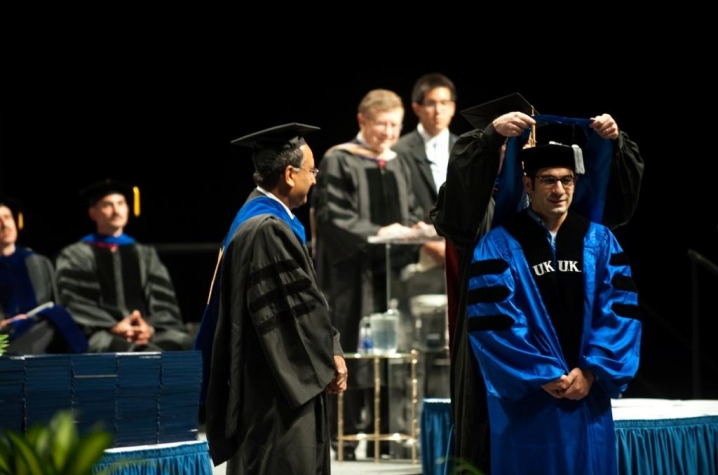UK Doctoral Grad Takes on National Poverty

LEXINGTON, Ky. (Sept. 14, 2010)– At the beginning of September, University of Kentucky doctoral graduate Charles Hokayem left the Bluegrass and headed to the nation's capital, with five years of applied economics under his belt. Armed with his Ph.D., Hokayem is ready to tackle his new role with the United States Census Bureau.
Hokayem will be an economist in the Housing and Household Economic Statistics division of the Census Bureau and has been charged with developing new poverty rate metrics.
"The federal government's methodology hasn’t been changed since the 1960s," said Hokayem. "Needless to say, we're in need of supplemental poverty measures."
Hokayem, a graduate research assistant under Center for Poverty Research (UKCPR) director James P. Ziliak for the past three years, is a perfect fit for the government agency.
The UKCPR researches the causes and consequences of poverty and inequality in the U.S., with a special emphasis on the South. Hokayem will be doing some of the same types of research in Washington, albeit in a larger pond.
Hokayem's work at UK has allowed him to see what he can do with economic data and public policy. "The Census Bureau is a data goldmine," said Hokayem.
In calculating the supplemental poverty rates, the UK alum will examine medical expenditures, food stamps, government housing and other programs by state, region and race. Current poverty rates don’t take into account the cost of living differences between geographic areas, he explained.
Interdisciplinary work is nothing new for Hokayem. At the UKCPR, Hokayem and his colleagues deal with comparable questions on a daily basis, but each academic discipline has a different way of viewing the issue.
The Poverty Center encompasses faculty from economics, sociology, political science and the Martin School of Public Policy, among others. Hokayem's dissertation was also interdisciplinary, combining health and psychology with economics.
UK is nationally renowned for its applied microeconomic program; the curriculum and faculty were some of the major reasons Hokayem chose UK for his postgraduate doctoral work five years ago. "I'm more into the actual and the applied than the theoretical and academic," he explained. "I like getting my hands dirty with data and providing information that informs government policy."
The UK economist will now focus on the nation, instead of a region, with data that reaches beyond Appalachia. But Hokayem's expertise will relocate as easily as his moving boxes, and his research will continue to help others.
"It's good to know the state of the world, if you want to make a difference," said Hokayem. "And I really enjoy discovering the story behind the numbers. UK and the Poverty Center have prepared me for what's next."




